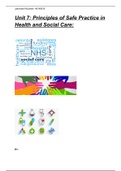Jasvinder Roushan 40145616
Unit 7: Principles of Safe Practice in
Health and Social Care:
P1:
,Jasvinder Roushan 40145616
Explain the implications of a duty of care in a selected health or social care
setting:
Introduction:
Duty of care is a legal obligation to provide care for service users which is imposed
by the law to prevent harm while they are using the health and social care settings.
Examples are hospitals, care homes and the GP. Duty of care is important as this
makes sure that the care being provided to the service user is of adequate standard
for the workplace and is promoting their rights of individuals. This will help to protect
users' safety as well as their health.
Every care worker is entitled to follow the 7 principles of safe practice which are:
Legal obligation to protect wellbeing and prevent harm: this is when the
professional in the setting is always working in the best interest of the service user to
protect them against harm. ‘Professional detachment’ occurs when the professional
has a relationship with the service user but is not emotionally attached, although
providing care without discriminating against others.
Upholding the rights and promoting the interests of individuals experiencing
abuse or neglect: this is when the professional is able to act as an advocate for the
service user if they fear that something may happen to them. For example if they feel
they are being intimidated by another care worker, the professional should speak to
peers so that the service user’s rights are not being discriminated against. There is
therefore a duty of care to help promote users safety and rights so that they do not
get abused physically or mentally.
Protecting health, safety and wellbeing: this is when the professionals have to
make sure service users are kept safe from being harmed. Also to make sure that
users are treated the same way as other individuals and that they are not intimidated
or treated unfairly. Professionals have to make sure that they’re actions towards the
service users are fair, safe and their judgements made should be considered
depending on the situation.
Ensuring safe practice: this is when all professionals follow the policies and
procedures that have been put in place in the health and social care setting. This is
to ensure that all service users and staff are not harmed or put in any form of risk. In
this way the safety of the workplace improves and if a monitoring organisation for
example the Care Quality Commission (CQC), checks up in the setting and it is seen
as not good, they are able to shut it down. All workplaces have hazards in the
setting, but to minimise the risks is very important for the service users and staff
members for their safety.
, Jasvinder Roushan 40145616
Code of conduct: this is a framework where it makes sure everyone knows how to
behave when talking to others and to maintain the quality of the service being
provided to ensure safe practice in the setting. This sets standards and gives ideas
of what to expect in the setting and gives indication of how to tell when something
does not meet the code of conduct standards.
Balancing individual rights with risks: we as professionals have the effect on
individuals where we are able to make decisions for a service user and this impacts
some individuals as they “fear losing their independence, which can cause conflict
with healthcare professionals and friends and family, who may feel that the service
user will not be able to cope with independent living”. (Billingham, 2016, p300)
some service users fear that by moving into a care home, they will lose their
independence and they feel as if it is a big step moving away from their independent
lifestyle, which is why service users have the right to accept or decline the any
course of treatment or care being provided for them as they may feel they are being
stripped away from their independence.
Acting in person’s best interest: this is when the professional can advise the
service user to make the best choice but by still respecting their choice, but still
providing the best decision so that they can receive the best outcome. If however,
the service user is unfit to make a decision, with the consent of the service user, the
health and social care professional can make a decision for them but if only they
have evidence that the service user lacks capacity to make a good decision for
themselves.
Case study 1:
Beeches Drop-in centre
In this case study, they have failed to provide the duty of care in this setting as they
have not taken into consideration the problems that are occurring at Beeches, which
are affecting the residents in the home. For example, there have been incidents that
have caused harm to individuals consequently not following the legal obligation to
protect wellbeing and prevent harm to the residents. As some residents have been
injured due to violence in the home, this can have repercussions on the other
residents as they may be afraid to approach staff members. Staff members have a
responsibility to the service users to minimise the risk of an individual being harmed.
Furthermore, care workers also have the obligation to ensure safe practice in the
home by making sure all the policies and procedures are being followed. This is
done in order to make sure that whatever happens in the home for example injuries
because of violence between individuals, should be reported and written down.
However, in this home, no record of incidents are kept as the “book got lost” and has






